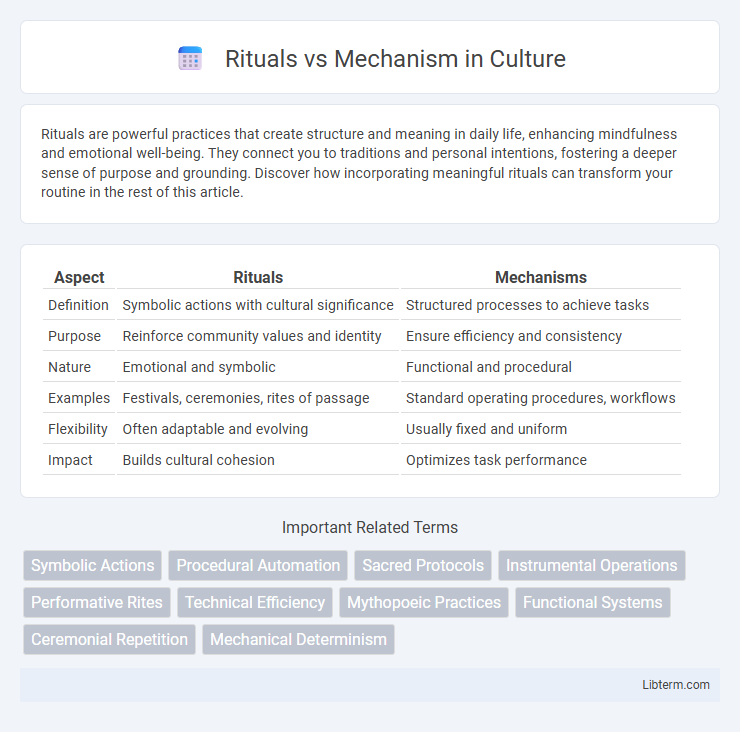Rituals are powerful practices that create structure and meaning in daily life, enhancing mindfulness and emotional well-being. They connect you to traditions and personal intentions, fostering a deeper sense of purpose and grounding. Discover how incorporating meaningful rituals can transform your routine in the rest of this article.
Table of Comparison
| Aspect | Rituals | Mechanisms |
|---|---|---|
| Definition | Symbolic actions with cultural significance | Structured processes to achieve tasks |
| Purpose | Reinforce community values and identity | Ensure efficiency and consistency |
| Nature | Emotional and symbolic | Functional and procedural |
| Examples | Festivals, ceremonies, rites of passage | Standard operating procedures, workflows |
| Flexibility | Often adaptable and evolving | Usually fixed and uniform |
| Impact | Builds cultural cohesion | Optimizes task performance |
Understanding Rituals and Mechanisms
Rituals are symbolic acts embedded in cultural or organizational contexts, fostering shared meaning and social cohesion through repeated behaviors and traditions. Mechanisms, in contrast, are structured processes or systems designed to trigger specific outcomes or responses within an organization or social group. Understanding rituals involves recognizing their role in reinforcing identity and group norms, while mechanisms emphasize functional efficiency and predictable cause-effect relationships.
Core Differences Between Rituals and Mechanisms
Rituals emphasize symbolic actions and cultural meanings that reinforce group identity and shared values, often performed in a specific, repetitive manner. Mechanisms focus on systematic processes and functional procedures designed to achieve practical outcomes or problem-solving objectives. The core difference lies in rituals fostering emotional and social cohesion, while mechanisms prioritize efficiency and predictable results.
Historical Evolution: Rituals vs Mechanism
Rituals originated in prehistoric societies as symbolic acts reinforcing social cohesion and spiritual beliefs, deeply embedded in cultural traditions and communal identity. Mechanisms evolved later during the Industrial Revolution, emphasizing standardized, efficient processes driven by technological innovation and scientific principles. The historical evolution highlights a shift from ritualistic practices rooted in meaning and symbolism to mechanized systems focused on productivity and control.
Psychological Impact: Rituals and Mechanisms
Rituals create a strong psychological impact by fostering emotional connections and a sense of belonging, which enhances motivation and well-being. Mechanisms, in contrast, operate through structured processes that emphasize efficiency and consistency but may lack emotional engagement. The psychological benefits of rituals often lead to increased trust and group cohesion, while mechanisms primarily support predictable outcomes and task completion.
Role in Society: Rituals vs Mechanistic Processes
Rituals serve as symbolic practices that reinforce social cohesion, shared values, and cultural identity within communities, fostering emotional connections and collective meaning. Mechanistic processes function through structured, predictable systems designed to achieve efficiency and consistency in societal operations, often emphasizing roles, rules, and formal procedures. While rituals prioritize cultural continuity and social bonding, mechanistic processes focus on functional order and systematic problem-solving in modern organizations.
Rituals and Mechanism in Modern Life
Rituals in modern life serve as intentional practices that foster emotional well-being, social connection, and a sense of purpose, often marking transitions or celebrating cultural heritage. Mechanisms, in contrast, refer to structured processes or tools designed to achieve functional outcomes efficiently within daily routines or organizational systems. Understanding the interplay between rituals and mechanisms highlights how humans balance meaningful experiences with practical necessities in contemporary society.
Efficiency vs Meaning: Contrasting Values
Rituals emphasize meaning by fostering emotional connection and reinforcing cultural identity, whereas mechanisms prioritize efficiency through standardized procedures and measurable outcomes. While rituals enhance group cohesion and personal significance, mechanisms streamline processes to maximize productivity and predictability. Balancing these contrasting values requires integrating meaningful practices without compromising operational efficiency.
Examples of Rituals vs Mechanisms
Rituals, such as daily morning meetings and weekly team-building activities, foster shared culture and reinforce organizational values through repeated symbolic actions. Mechanisms include formal policies like performance appraisal systems and standardized operating procedures designed to ensure consistent compliance and efficiency. While rituals emphasize social cohesion and meaning, mechanisms focus on control and formalized processes within an organization.
Benefits and Limitations of Each Approach
Rituals foster social cohesion and create shared meaning by reinforcing group identity and emotional bonding, but they can become rigid or exclusionary when overemphasized. Mechanisms provide structured, repeatable processes that enhance efficiency and predictability, yet may lack flexibility and fail to address deeper relational dynamics. Balancing rituals' emotional engagement with mechanisms' procedural clarity ensures both connection and consistency in organizational or social contexts.
Balancing Ritual and Mechanism for Success
Balancing rituals and mechanisms is essential for organizational success, as rituals foster culture and employee engagement while mechanisms ensure efficiency and control. Effective leaders integrate meaningful rituals like team celebrations and regular feedback sessions with structured mechanisms such as performance metrics and standardized procedures. This balance enhances motivation, aligns behaviors with strategic goals, and drives sustainable performance outcomes.
Rituals Infographic

 libterm.com
libterm.com